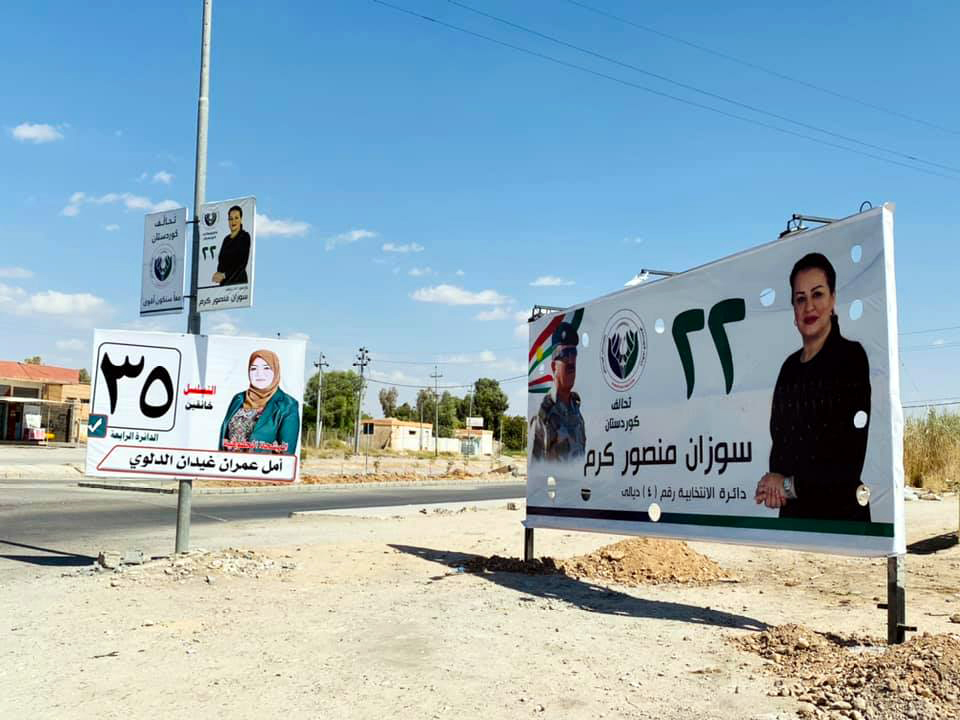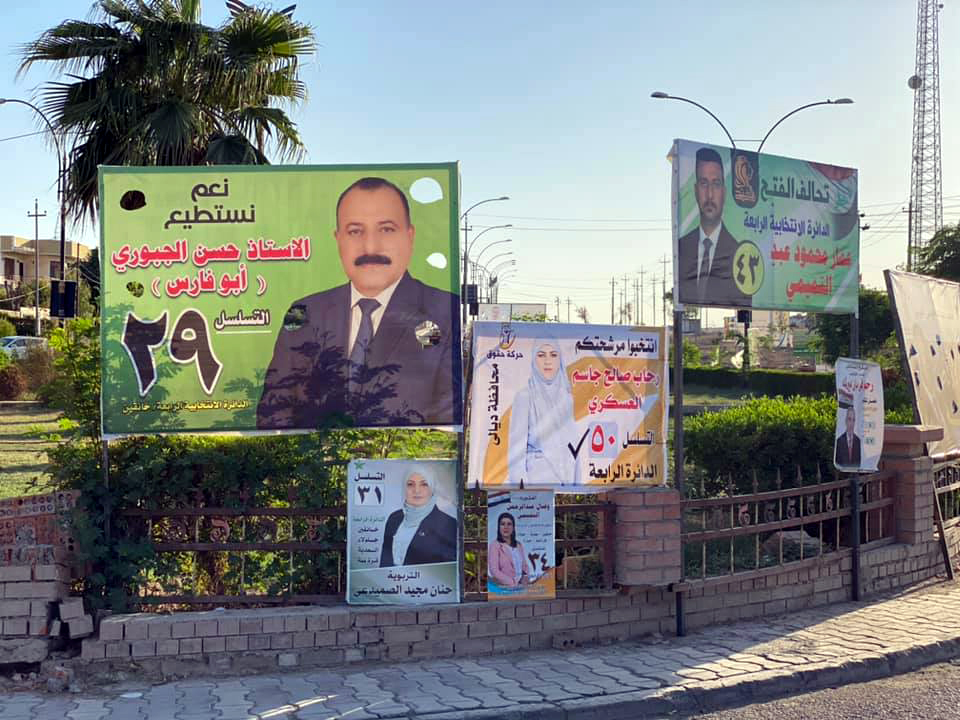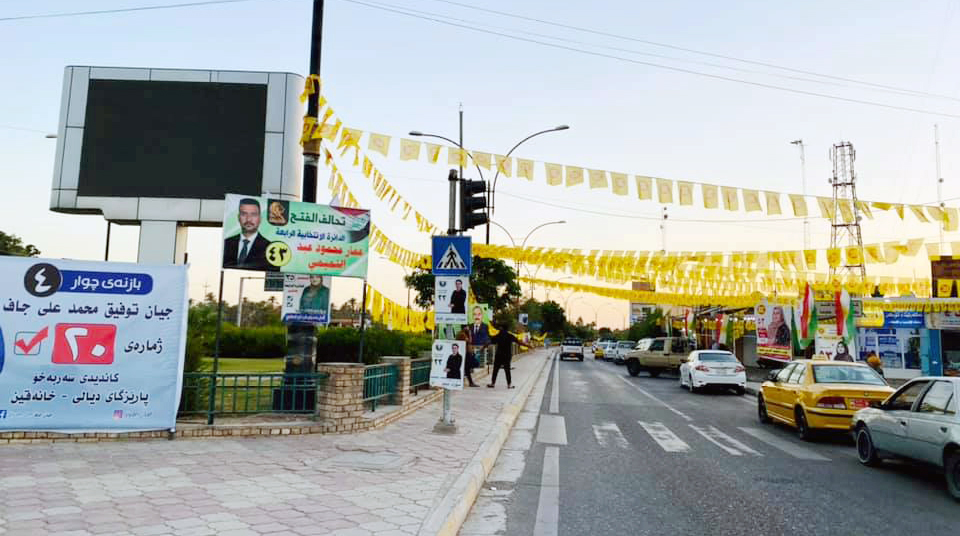The Kurdish political parties are competing to earn more seats in a town northeast of Baghdad where 35 candidates look at three seats at the house of representatives in Baghdad.
On October 10th, four million voters in Diyala over four electoral districts will nominate 14 winners out of 164 nominees, four seats allocated for female candidates per women quota.
About 200,00 to 250,000 voters of electoral district four from the mainly Kurdish towns of Khanaqin, Qaratapa, Sadiya, Hamrin, Kifri suburbs and Jalawla are to vote for 35 candidates.
Kurds in Kahnaqin have seven candidates, independent and party affiliated, whom compete 28 candidates, total 15 women and 20 men, of other ethnicities for the three seats of the fourth electoral district.
The Kurdistan alliance, of Patriotic Union of Kurdistan and Gorran (Change Movement), and the Kurdistan Democratic Party KDP each has one candidate while the Kurdistan Social Democratic Party KSDP has two candidates and a Kurd candidate by National Path (Nahij), an alliance of several Shiite parties.
Frustration of Kurdish voters
Most of the voters interviewed by KirkukNow are furious as their disputed territories has turned into a battle field between the Iraqi Security Forces ISF and the regrouping militants of the Islamic State in Iraq and Syria ISIS.
The electoral campaigns are mere empty words ahead of elections and later they are deserted to face their unknown destiny.
“Most of people don’t believe in elections because all those were elected by Kahnaqin people have not stood by their words and Khanaqin is facing undetermined destiny because its representatives lied to its voters,” said Kamaran Khurshid, a teacher from Khanaqin in the 40s.
all those were elected by Khanaqin people have not stood by their words
The Independent High Electoral Commission IHEC has allocated 467 ballot stations for over 205,000 voters.
The new electoral law ratified last November, a key demand of demonstrators in 2019, changed each of the country’s 18 provinces into total 83 electoral districts in order to prevent parties from running on unified lists, which has in the past helped them easily take all the seats in a specific province. Instead, the seats would go to whoever gets the most votes in the electoral districts.
“I have gone to the polls in the last two rounds and will in October in order to preserve the Kurdish identity of Khanaqin to vote for a Kurdish candidate,” said Kamaran Khurshid.
Khanaqin, on the border with Iran, is part of the disputed territories between Baghdad and Erbil which runs through the oil rich city of Kirkuk up to Shingal west of Ninewa on the border with Syria.
“I don’t want Arabization in our town again so if the Kurds won’t make adequate votes, they will takeover the town and exclude the Kurds. I will vote for one of the Kurdish candidates” Khurshid Added.
In 1970s, the Bath party led by Saddam Hussein has moved part of the Kurdish population from disputed territories to the north of Iraq and replaced them with Arab settlers.
Following ousting Saddam regime in 2003, the Kurds took control over part of the disputed territories and marched forward in 2017 when ISIS took over large swathes of Iraq forcing Iraqi forces to desert some territories where the Kurdish Peshemrga replaced it.
After the declaration of victory over ISIS in 2017, and a referendum for independence by the Kurds in Kurdistan region and parts of the disputed territories in September 2017, the ISF took back control in the disputed territories in October 2017.
PUK was the only Kurdish party that one seats in Khanaqin yet for upcoming elections it is concerned about its only seat due to the numerous Kurdish candidates.
Back in 2014, the PUK won two seats which dropped to one seat in 2018.
“Some Kurdish candidates by the Kurdish parties and intendent will (negatively) affect Kurdish unity,” said Abbas Mahmood, spokesperson of Kurdistan alliance in Diyala.
“Others should have taken the sensitive situation into consideration and left it for the two leading Kurdish parties PUK and KDP.”
The fourth electoral district embraces 81,000 voters of Khanaqin district, 54,000 in the sub-district of Jalawla, 32,000 in Sa’diya, 38,000 in Qaratapa and Jabara.

Diyala, September 2021- Three Kurdish political parties are competing in Khanaqin. KirkukNow
In Mid-September, members of PUK in Jalawla said they have been stopped from electoral campaign and hanging banners by militiamen of Asaeb Ahl Al-Haq AAH (The Righteous League).
“We are concerned because we the area is not under our control and those who are in power can make fraud,” he added.
“We are afraid Kurds won’t earn any seats because in those sub-districts there are security breaches and can’t lead electoral campaigns in order to mobilize Kurdish affiliation of people, Kurds and Arabs, in order to vote for us.”
The eastern province of Diyala is home to 1.6 million Arabs, Kurds and Turkmens, Shiite and Sunnis.
Currently, local police is taking over security responsibility in the center of Jalawla, while the ISF and the umbrella for Shiite militias Popular Mobilization Forces PMF or (al-Hashd al-Sha’bi) are stationed in the outskirts.
“Poster of Kurdish candidates are torn. You hang it in daytime and it is removed at night. We are afraid that our voters will face intimidation in ballot day as militiamen affect the process. We noticed these threats and the signs are clear,” Mahmood said.
We are afraid that our voters will face intimidation in ballot day
According to the new electoral law, tearing and removing electoral posters are crimes and the perpetrators face imprisonment and fines as well.
“I call on the deferral government to send disciplined regular troops to Khanaqin to stop intimidation and interference,” Kurdistan alliance spokesman said.
The PUK and KDP made 61,000 votes in 2014 yet it has dropped to 55,000 in 2018 following October events which made a crack between both parties.
“I wish we had an alliance with KDP in the disputed territories alike ours with Gorran in order to compete our opponents not ourselves.”
The KDP: One seat is ours
Opposite to PUK concerns and fears, the KDP is confident it is going to win a seat though it had not made one in the last two rounds in Khanaqin.
“The expectations are high that KDP will earn enough votes to guarantee one seat in fourth electoral district of Khanaqin,” said Ayad Karkuki, senior member of KDP office 15 in Khanaqin.
“We are leading wide campaigns in Khanaqin and believe many voters even neutral people will vote for KDP,” Karkuki said. The KDP has made 10,000 votes in 2018 and failed to win a seat while the PUK earned almost triple of KDP.
IS militants controlled Jalawla in mid-2014, but the Peshmerga (Kurdish fighters) took over the town end of 2014. A KirkukNow follow-up found out that a total of 4,000 houses and other civilian properties were destroyed during the confrontations with IS. Over 40 villages in the suburbs f Khanaqin were evacuated due to threats by regrouping ISIS militants.

Diyala, September 2021- 35 candidates from different ethnicities and sects compete for three seats of Diayal’s fourth electoral district. KirkukNow
The Iraqi ministry of defense and the KRG ministry of Peshmerga have agreed to form joint operation commands in order to share intelligence information in the security vacuum between Baghdad and Erbil in order to put an end to the threats posed by the sleeper cells of IS.
“People ask for the return of Peshmerga not gunmen of any party in order to avoid events like October 16th because the absence of Peshmerga has led to security gap in Khanaqin and no other force can protect the area,” Karkuki believes.
The KDP has a candidate in Mandali, district, the second electoral district of Diyala for which three seats are allocated.
KSDP thrives for a seat
The KSDP has not made it to the Iraqi parliament since the second round is working hard to earn a seat and compete KDP and Kurdistan alliance.
“We believe this system is in the interest of small parties and we can get good votes,” said Hussein Jalil, KDP senior official in Diyala.
Jail believes Kurds will win one seat in Diyala per women quota as the political parties failed to run for ballots under one unified list.
Six of the seven Kurdish candidates in Diyala are women.
“We proposed a unified list yet the leading parties have not responded.”
Kurds will win one seat in Diyala per women quota
“We still hope the Kurds win one seat in Diyala. Making no seats is a big loss so we hope KSDP gets that seat.”
The 329-member house of representatives was elected in May 2018. The vote is held every four years, but 2019 protesters have been demanding early elections.
Out of 40 million population, 25 million eligible voters run to the ballots on October 10th to elect only 329 members into Iraqi parliament out of 3,234 nominees.





